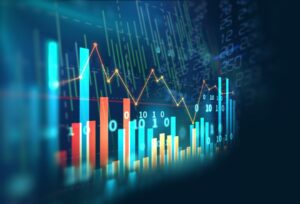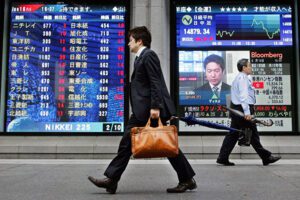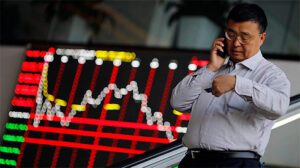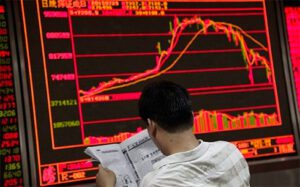
Most of the stock indices of the largest countries in the Asia-Pacific region are growing on Tuesday following the rise of the US market a day earlier against the background of good quarterly reports of companies.
The only exception is the Chinese Shanghai Composite index, which fell 0.06% by 8:35 a.m. CET.
The Hong Kong Hang Seng added 1.2% by this time.
BYD Co. stock quotes. on the Hong Kong Stock Exchange jumped 6.4%. The leading manufacturer of vehicles powered by new energy sources in China expects net profit growth in the third quarter by almost 5 times (by 365%) – up to 5.5-5.9 billion yuan ($764-820 million), according to preliminary calculations.
Auto parts subsidiary BYD Electronic rose 7.5%.
Top gainers in Hong Kong on Tuesday also included solar panel maker Xinyi Solar Holdings (+5.7%), jewelry chain Chow Tai Fook Jewelery Group (+4.9%), chip maker Sunny Optical Technology Group Co. (+4.8%) and automaker Geely (+4%).
In addition, Internet retailers Alibaba Group and JD.com rose 3.8% and 2.7%, respectively, while Internet giant Tencent Holdings Ltd. – by 2.9%.
The value of the Japanese index Nikkei 225 increased by 1.5% by 8:31 am KSK.
The most significant increase in quotations is demonstrated by shares of medical services provider M3 Inc. (+5.5%), electronics manufacturer Sharp Corp. (+5%) and musical instrument manufacturer Yamaha Corp. (+4.9%).
The value of Recruit Holdings Co. jumped by 4.8%. The recruiting company announced the repurchase of its own shares in the amount of 150 billion yen ($1.01 billion), which is 2.5% of the capital. The program will run until March 14, 2023.
Also rising stock quotes financial group Mitsubishi UFJ (+1%), clothing retailer Fast Retailing (+1.3%) and consumer electronics manufacturer Sony Group (+1.2%).
The South Korean index Kospi rose by almost 1% by 8:26 am KSK.
Quotes of securities of one of the world’s largest manufacturers of chips and electronics Samsung Electronics Co. decline by 0.5%, while the cost of automaker Hyundai Motor rose by 0.3%.
The Australian S&P/ASX 200 gained 1.7%.
The capitalization of the world’s largest mining companies BHP and Rio Tinto increased by 1.4% and 0.1%, respectively.
Shares of technology companies are also going up: Block Inc (+7.2%), Xero (+3.4%), Life360 Inc (+3%), Seek (+3.6%) and Wisetech Global (+3.4%) ).

The stock indices of the largest countries in the Asia-Pacific region (APR) do not show a single dynamics on Monday morning, market participants monitor the situation in the global economy and evaluate the statements of Chinese officials during the 20th Congress of the Chinese Communist Party (CCP).
The Chinese economy showed signs of “significant improvement” in the third quarter, Zhao Zhenxin, deputy head of the National Development and Reform Commission, said on the sidelines of the convention.
In March, April and July, the Chinese economy was negatively affected by factors that could not be foreseen, including external events, coronavirus outbreaks and extreme weather events, MarketWatch quoted a MarketWatch official as saying. At the same time, overall business activity, from industrial production and investment to consumer spending, continues to grow, he added.
On Monday, it also became known that the People’s Bank of China injected 500 billion yuan ($69.6 billion) into the financial system under the medium-term lending program (MLF). At the same time, the rate on loans for a period of one year, issued under the MLF, was maintained at the level of 2.75% per annum, the NBK said.
Meanwhile, Indonesia’s trade surplus in September fell to $4.99 billion from $5.76 billion in August and was lower than analysts’ expectations of $5.30 billion.
Exports decreased by 11% in monthly terms and increased by 20.3% in annual terms, amounting to $24.80 billion. The decline is explained by falling prices for raw materials, including nickel and palm oil. Meanwhile, the volume of imports decreased by 10.6% compared to August and amounted to $19.81 billion.
Hong Kong’s Hang Seng index is down 0.4% by 8:26 a.m., renewing a minimum in 11 years. China’s Shanghai Composite, meanwhile, rose 0.2%.
Tianqi Lithium fell 4.4%, Contemporary Amperex 2.8% and Longi Green Energy 2%.
Shares of Alibaba (SPB: BABA) are down 2% in Hong Kong trading, while automaker Li Auto (SPB: LI) is down 2.5%.
The value of the Japanese Nikkei 225 index fell by 1.2%.
The decline leaders among the components of the index are shares of technology companies SoftBank Group (-1.8%), Tokyo Electron (-1.5%), Shift Inc. (-9%), M3 Inc. (-4.3%) and Recruit Holdings (-3%).
Fast Retailing fell 1.5%, Toyota Motor – 0.7%, Sumitomo Mitsui – 1.3%, Sony Group – 1.1%.
South Korean index Kospi rose by 0.3%.
The market value of one of the world’s largest chip manufacturers Samsung Electronics Co. increased by 1.1%, automaker Hyundai Motor – by 0.3%.
The Australian S&P/ASX 200 fell 1.4%.
The leader of the decline is the mining and energy sectors. Capitalization of BHP Group decreased by 2.7%, Fortescue Metals – by 2.9%, Rio Tinto – by 2.8%, Woodside Energy – by 2.6%, Santos Ltd – by 2.7%.
Stock indices of the countries of the Asia-Pacific region are confidently rising in trading on Friday after several days of decline this week.
The Hong Kong Hang Seng jumped 3.5% by 8:25 am. The indicator fell for six sessions in a row, after which it fell to its lowest point in the last 11 years. China’s Shanghai Composite index, meanwhile, added 1.8%.
In Hong Kong, the shares of biopharmaceutical companies are most actively rising in price: papers of Wuxi Biologics Inc. add 12.4%, Sino Biopharmaceutical (SPB: 1177) Ltd. – 8.2% and CSPC Pharmaceutical Group Ltd. – 6%.
In addition, the shares of real estate development companies are becoming leaders in the growth of quotations: Country Garden Services Holdings Co. Ltd. rises in price by 9%, Longfor Group Holdings Ltd. – by 5.7%.
Investors are also evaluating September data on changes in consumer and producer prices in China.
Consumer prices (CPI) rose 2.8% year-on-year last month after rising 2.5% in August, the National Bureau of Statistics (GSO) of the People’s Republic of China said. Analysts on average also expected growth to accelerate to 2.8%, according to Trading Economics. The rate of increase was the highest since April 2020.
Producer prices (PPI index) in China last month rose by 0.9% in annual terms – the lowest rate in 20 months. Analysts’ consensus forecast was for growth to slow to 1% in September from 2.3% in July. The PPI fell 0.1% on the previous month (-1.2% in August).
The value of the Japanese Nikkei 225 index by 8:30 Moscow time increased by 3.3%.
Shares of Asia’s largest clothing retailer Fast Retailing Co. jumped 8%. The company’s net profit for the fiscal year that ended on August 31 jumped 61%, while revenue jumped 7.9%. Fast Retailing expects operating income to increase by 18% in the current financial year.
The growth leaders of quotations are also securities of IT company NTT Data Corp. (+5.6%) and pharmaceutical Daiichi Sankyo Co. Ltd. (+5.5%).
The South Korean index Kospi added 2.3% by 8:40 Moscow time.
Quotes of securities of one of the world’s largest manufacturers of chips and electronics Samsung Electronics Co. grow by 2.2%, the value of automaker Kia Corp. increased by 1.2%.
The Australian S&P/ASX 200 rose 1.75%.
The capitalization of the world’s largest mining company BHP rose 2%, while shares of its rival Rio Tinto rose 1.1%.

Stock indices of the Asia-Pacific region fall on Thursday, following the dynamics of the US stock market.
Investors are evaluating the minutes of the September meeting of the US Federal Reserve, which showed that the US Central Bank is expected to continue raising key rates and keep them high until inflation shows signs of slowing down.
Meanwhile, a number of representatives of the Fed’s leadership believe that in the face of uncertainty, it will be important to adjust the pace of further tightening of monetary policy in order to limit the risk of negative consequences for the economy, the protocol says.
The market is now waiting for the publication of US inflation data in September, which may indicate the effectiveness of the Fed’s policy. The Labor Department report is due Thursday at 3:30 p.m., and analysts on average expect U.S. consumer prices to rise 8.1% year-on-year last month after rising 8.3% a month earlier, according to Trading Economics.
The Hong Kong Hang Seng has lost 1% by 8:13 Moscow time, it is falling for the sixth trading in a row and is at its lowest level in the last 11 years. China’s Shanghai Composite, meanwhile, shed 0.08%.
In Hong Kong, tech stocks continue to fall sharply after it became known that the US is tightening export controls on high-tech semiconductor products and chip-making equipment. Papers JD.com Inc. (SPB: JD) down 3.2%, Netease Inc. (SPB: NTES) – 2.8%, Tencent (SPB: 700) Holdings Ltd. – 1.3% and Alibaba (SPB: BABA) Group – 1%.
At the same time, investors are being negatively impacted by increased coronavirus restrictions in China ahead of the 20th Congress of the Communist Party of China, which begins this weekend.
Among the biggest losers among the Hang Seng components are also listed real estate developers Country Garden Holdings (SPB: 2007) Co. Ltd. (-9.2%) and Longfor Group Holdings Ltd. (-4.4%), and China Merchants Bank Co. Ltd. (-4.2%).
The value of the Japanese Nikkei 225 fell by 0.5% by 8:20 Moscow time.
The leaders of the fall in quotations are papers Toho Co. Ltd. (-3.9%), Daikin Industries Ltd. (-2.9%) and Toto Ltd. (-2.8%).
Meanwhile, the value of Toshiba Corp. up 7.6% on news that a group of investors led by Japan Industrial Partners Inc. put forward an offer to buy the company for 2.8 trillion yen ($19.06 billion).
The Australian S&P/ASX 200 fell 0.07%.
The capitalization of the world’s largest mining company BHP fell by 0.8%, while the shares of its competitor Rio Tinto 0.6%.
The South Korean index Kospi by 8:35 Moscow time fell by 1.4%.
Quotes of securities of one of the world’s largest manufacturers of chips and electronics Samsung Electronics Co. fall by 0.4%, the cost of automaker Hyundai Motor fell by 1.5%.

Stock indexes in the Asia-Pacific region (APR) mostly fell in trading on Tuesday, with the exception of the Shanghai Shanghai Composite.
Including pressure on the markets had a fall in the shares of the technology sector.
As reported, the US authorities last week introduced new restrictions on the supply of advanced chips and equipment for the production of semiconductors to China to prevent the development of the Chinese military industry through these products.
This decision negatively affected the papers of semiconductor manufacturers, including South Korean Samsung Electronics Co. and its competitor Taiwan Semiconductor Manufacturing Co. (TMS).
In addition, Asian markets declined following the dynamics of Wall Street.
American stock indices fell on Monday for the fourth session in a row. At the same time, the value of the Nasdaq Composite fell to a minimum in more than two years – since June 28, 2020, according to Dow Jones Market Data.
The value of the Japanese Nikkei 225 index by the close of trading decreased by 2.6%.
Japan’s current account surplus narrowed to 58.9 billion yen in August from 1.5 trillion yen in the same period a month earlier, according to Japan’s finance ministry. Analysts on average had forecast a surplus of 121.8 billion yen, according to Trading Economics.
Meanwhile, Japan’s services sentiment indicator rose 2.9 points in September from a month earlier, to a high since June of 48.4 points, according to Economy Watchers data.
Among the components of the index, the leaders of the fall were shares of electric motor manufacturer Nidec Corp. (-9.4%), automation equipment specialist SMC Corp. (-6.7%) and construction equipment manufacturer Hitachi Construction Machinery Co. Ltd. (-6.4%).
The Hong Kong Hang Seng fell 2.2%, while the Shanghai Shanghai Composite rose 0.2%.
The most significant fall in Hong Kong paper developers Country Garden Holdings Co. Ltd. (-6.8%), Longfor Group Holdings Ltd. (-8.2%) and Internet company Meituan (-7.2%).
Shares of Contemporary Amperex Technology Co. Ltd. (CATL) at the auction in Shenzhen rose by 6%. The country’s largest lithium-ion battery maker expects third-quarter net profit to more than double year-over-year, the company said in a statement.
TMS shares plunged 8.3% on the Taiwan Stock Exchange.
The South Korean index Kospi k decreased by 1.8%.
The value of shares of automaker Hyundai Motor fell by 4.3%.
Shares of Samsung, one of the world’s largest manufacturers of chips and electronics, fell 1.4%, while shares of its rival LG Electronics fell 4.3%.
The Australian S&P/ASX 200 fell 0.3%.
The capitalization of the world’s largest mining companies BHP and Rio Tinto fell by 0.4% and 0.6%, respectively.

Stock indices of the Asia-Pacific region (APR) fall sharply during trading on Tuesday.
In particular, the pressure on the markets is exerted by the fall in the shares of the technology sector.
As reported, the US authorities last week introduced new restrictions on the supply of advanced chips and equipment for the production of semiconductors to China to prevent the development of the Chinese military industry through these products.
In addition, Asian markets are declining following the dynamics of Wall Street.
American stock indices fell on Monday for the fourth session in a row. At the same time, the value of the Nasdaq Composite fell to a minimum in more than two years – since June 28, 2020, according to Dow Jones Market Data.
The value of the Japanese index Nikkei 225 to 8:19 qoq decreased by 2.6%.
Japan’s current account surplus narrowed to 58.9 billion yen in August from 1.5 trillion yen in the same period a month earlier, according to Japan’s finance ministry. Analysts on average had forecast a surplus of 121.8 billion yen, according to Trading Economics.
Meanwhile, Japan’s services sentiment indicator rose 2.9 points in September from a month earlier, to a high since June of 48.4 points, according to Economy Watchers data.
Among the components of the index, Nidec Corp. shares are among the drop leaders. (-9.4%), SMC Corp. (-6.7%) and Yaskawa Electric Corp. (-6.2%).
The Hong Kong Hang Seng fell 2.2% by 8:25 qoq, the Shanghai Shanghai Composite – 0.2%.
Longfor Group Holdings Ltd. shares fell most significantly in Hong Kong. (-8.2%), Meituan (-7.2%) and Country Garden Holdings Co. Ltd. (-6.8%).
The South Korean index Kospi by 8:23 q decreased by 2.1%.
The value of shares of automaker Hyundai Motor fell by 4.8%.
Quotes of securities of one of the world’s largest manufacturers of chips and electronics Samsung Electronics Co. are down 1.4%, while shares of its rival LG Electronics are down 4.3%.
The Australian S&P/ASX 200 fell 0.3%.
The capitalization of the world’s largest mining companies BHP and Rio Tinto fell by 0.4% and 0.6%, respectively.